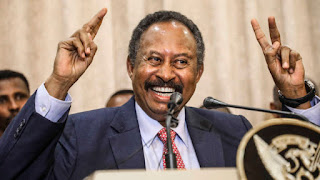Note from Sudan Watch Editor: Further below are two comments left at the following FT article. The second comment ends by saying “It's thanks to the AU's unrelenting efforts that we have reached this encouraging outcome whence new challenges will have to be addressed in a positive and determined way.”
The AU and its peacekeepers are doing a great job. 16 years ago the fledgling AU was derided and ridiculed. Not now. Well done Mr Mbeki et al! Africa can be proud. Read The AU’s role in brokering Sudan deal offers lessons for the future by Femi Amao, Senior Lecturer, University of Sussex, UK 21 Aug 2019.
Article from the Financial Times.com
By TOM WILSON in Nairobi
Dated Thursday 22 August 2019
Sudan’s new prime minister vows to rebuild battered economy
Economist Abdalla Hamdok sworn in under transitional agreement
Photo: Abdalla Hamdok is expected to form a civilian cabinet next week © AP
Sudan’s new prime minister has vowed to make peace with the country’s rebel factions and rebuild its battered economy as he seeks to bring an end to the uncertainty that followed the military overthrow of dictator Omar al-Bashir in April after months of anti-government protests.
Abdalla Hamdok, a respected former official of the UN Economic Commission for Africa, was sworn in on Wednesday [21 Aug] under a transitional agreement that will see the military share power with civilian administrators until elections are held in three years’ time. “The government’s top priorities are to stop the war, build sustainable peace, address the severe economic crisis and build a balanced foreign policy,” he said.
In the wake of Mr Bashir’s ouster, the military had initially pledged to pass power immediately to the civilian opposition but then stalled, leading to further violence. Under the new deal signed last week Sudan will be run by an 11-member sovereign council made up of military and civilian appointees until the elections are held. For the first 21 months, the council will be headed by Lieutenant General Abdel Fattah al-Burhan, who has run the country since April, before the leadership rotates to a civilian. Lt Gen Burhan was also sworn in on Wednesday.
Though the deal places Sudan under the ultimate control of the army for another 21 months, it is the first time that the north African country has not been under full military rule since Mr Bashir seized power in coup in 1989. The long transition period is seen as a victory for the pro-democracy movement, which has said it needs at least three years to rebuild the state hollowed out under Mr Bashir if the country is to have any chance of holding free and fair elections.
Mr Hamdok’s appointment was celebrated across Sudan, where hundreds of thousands of citizens staged protests in the past nine months and hundreds have been killed. Born in Sudan’s central Kordofan province, Mr Hamdok holds a PhD in economics from the University of Manchester and has had a long career as a respected international economist.
“Hamdok is a Sudanese scholar and a technocrat with a track record of achievement,” said Amjed Farid, a spokesperson for the Sudanese Professionals Association, one of the groups that spearheaded the protest movement that toppled Mr Bashir.
“He faces a lot of difficult questions and a very dark legacy of the Bashir regime but I think he, and the team he is about to select, has enough popularity and peoples’ support to implement the very difficult emergency plans needed to rescue Sudan in this transitional period of three years,” said Mr Farid.
Thirty years of autocracy, corruption and the prolonged impact of international sanctions on Mr Bashir’s government have brought the Sudanese economy to its knees. Last year the value of the Sudanese pound plummeted by 85 per cent against the dollar and inflation reached nearly 70 per cent, one of the highest levels in the world. Mr Hamdok is expected to form a civilian cabinet next week. The ministers of defence and interior will be selected by the military.
Two Comments
Misfan
This is one of the best outcome Sudanese people can hope for. Now its the international community must keep the pressure on the military to loosen their grip on power. All the well wishes for new democratic era for Sudanese people.
OTTOANGY
Allow me Misfan to share your wishes " for a new democratic era " in Sudan. The success of the battle for democracy in that country could turn out to be of pivotal impact for other countries in the MENA region. No other country could some day become a more promising role model for other entities in that area, given the fact that Sudan is an Arab and African country, a transit avenue from the Arabian space to black Africa. But given the unsavoury winds currently blowing in the Arab world I guess that the role of the African Union and particularly of bordering countries like Ethiopia will be vitally important for the success of the budding Sudanese democracy. It's thanks to the AU's unrelenting efforts that we have reached this encouraging outcome whence new challenges will have to be addressed in a positive and determined way.
To visit original article click here: https://www.ft.com/content/25258566-c4ba-11e9-a8e9-296ca66511c9
Further Reading
Article from MSN.com
Written by JUSTIN LYNCH, Associated Press (AP)
Dated Sunday 25 August 2019
AP Interview: Sudan PM seeks end to country's pariah status
Full story here: https://www.msn.com/en-gb/news/world/ap-interview-sudan-pm-seeks-end-to-countrys-pariah-status/ar-AAGjlYi
Full story here: https://www.msn.com/en-gb/news/world/ap-interview-sudan-pm-seeks-end-to-countrys-pariah-status/ar-AAGjlYi


No comments:
Post a Comment